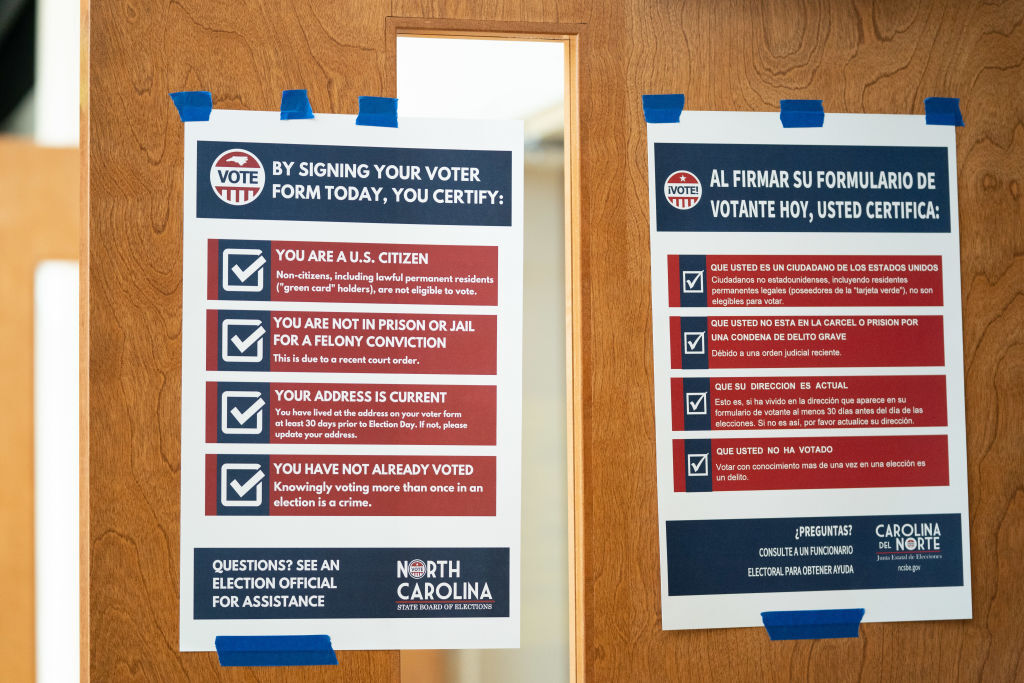North Carolina Launches Voter Roll Program That Could Disenfranchise Tens of Thousands

North Carolina formally launched a project Thursday that could disenfranchise tens of thousands of voters, despite pushback from national Democrats.
The plan, conceived by a former top GOP legislative aide, would create a two-tiered system for some voters with missing information — allowing them to vote in federal elections, where legal protections for voters are stronger, but not in state and local contests. The U.S. Department of Justice (DOJ) sued North Carolina last month, alleging that the state failed to collect information from voters required by the Help America Vote Act (HAVA). In response, the North Carolina State Board of Elections released a plan that requires voters with missing information to vote a provisional ballot unless they respond to mail notifications by providing the additional information.
The board is asking an estimated 103,000 voters to reach out and provide information that’s allegedly missing from their files.
The Democratic National Committee (DNC) sent a letter to North Carolina officials this week warning that the plan violates federal law and puts the state at risk of facing litigation.
Sam Hayes, the board’s executive director, took issue Thursday with Democrats who have described the plan as a voter purge and dismissed their concerns as misinformation. Hayes, a former GOP aide, was appointed to the position in June when Republicans took control of the board, replacing a respected nonpartisan election administrator.
“I want to make it abundantly clear that this project will not result in the removal of any eligible voter from the voter rolls, as some have inaccurately suggested,” Hayes told reporters Thursday. “Instead, it will result in more complete voter rolls in full compliance with state and federal law. We’re also hopeful that it will have the added benefit of helping us settle pending litigation on this topic.”
Still, among the questions left unanswered by the board: whether there will be a cure process for provisional voters whose information fails to validate; and how exactly the board determined which voters are treated as lacking the required information.
The plan also will create separate rules for state and federal elections. The DNC noted that missing information isn’t a permissible reason to disenfranchise a voter under the National Voter Registration Act (NVRA). So voters who vote provisionally and fail to provide the required information will have their vote counted in a federal race – but not in a state or local race, Paul Cox, the board’s general counsel, said Thursday.
“The U.S. Department of Justice has made clear to us in our discussions that they interpret the National Voter Registration Act, the federal law, to require that votes that are cast provisionally under this process [are required] to count for federal contests.” Cox said. ”Because those are duly registered voters and you can’t, under the National Voter Registration Act, deny them the ability to cast their ballots in a federal contest.”
Cox went on to explain: “We have the NVRA applying to federal contests – there’s one set of rules that apply to those provisional votes. For state and local contests, there’s a different set of rules that apply to those votes.”
Cox pointed to a North Carolina Court of Appeals ruling earlier this year, saying the court instructed the state not to count ballots from voters who are missing required identification information.
The issue came before the court when Republican candidate Jefferson Griffin challenged thousands of votes in an attempt to overturn the election he lost to North Carolina Supreme Court Justice Allison Riggs in November. Griffin currently serves on the Court of Appeals.
Cox added that the provisional ballot form requires voters to include their drivers license or social security number, so it’s likely they will provide the information required to have their vote counted during the process.
“The county boards use a database-matching process with the Social Security Administration and the DMV to make sure that those numbers are valid, that they match up with that particular person’s identity,” he said.
Hayes said Thursday internal efforts to collect the missing information have reduced the number of impacted voters. He estimated 103,000 voters still do not have any record on file of the information required under HAVA. A second group – an estimated 99,000 voters – complied with the requirement but are missing current information, so they will receive a notice by mail but will not be required to vote provisionally.
Hayes insisted that contrary to what Democrats have said, the project does not constitute a voter purge, even if voters are disenfranchised by the program.
“This is just an effort to comply with law, to settle this litigation,” Hayes added. “The NVRA compels, as you may know, that all voters who are duly registered be allowed to vote and have their vote count. We just need to go back and collect this information, and we’ve tried to make that as clear as possible, despite the misinformation out there. So we hope, certainly, that this will satisfy their concerns.”
Hayes said the state has not yet mailed the notices but plans to send them out in early August.
The board launched a website for the project on Thursday that includes a tool that allows North Carolinians to search the list of impacted voters. The data will be updated every morning to show only registered voters who still have missing data, the board said. Voters on the list have three ways to update their registration: using the DMV website, visiting their county board of elections office in person or mailing back the notice they receive in the mail with the requested information.
The board is also instructing local county election boards to look for the missing information in their records and enter it into the voter registration system themselves.